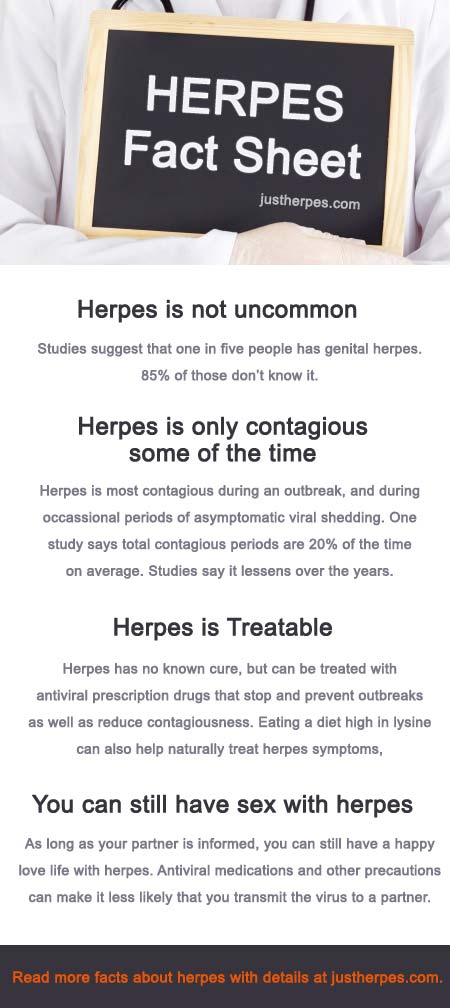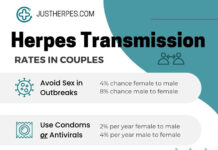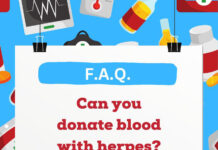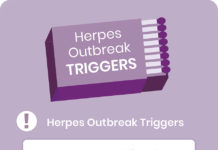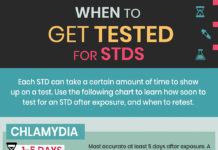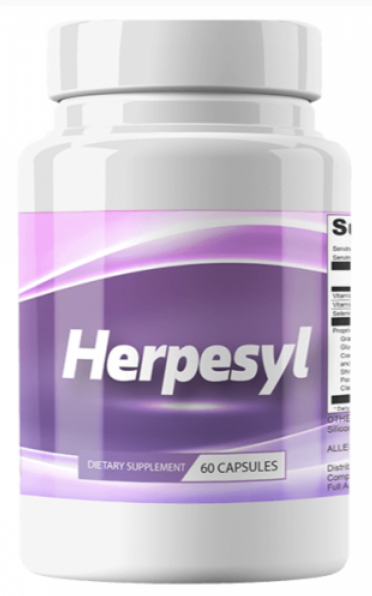It’s crucial to know the herpes facts and myths. Herpes is misunderstood and common, yet under-diagnosed. A massive 85% of those who have herpes don’t know. This leads to the silent spread of the virus, as do myths about safe sex. See herpes facts, myths, and statistics all on this page — plus tips for treating it.
Herpes Facts and Myths

1. Herpes is not uncommon.
Herpes is actually not uncommon. This is surprising to many when you consider the stigma associated with the virus. The fact is that herpes is prevalent, yet under-diagnosed: About 85% of those who have it don’t know. Here are some statistics about herpes in the American population, from this page.
- About one out of five people in the United States has genital herpes.
- That’s more than 50 million people in the United States who have genital herpes.
- 85% of people with genital herpes don’t know they have it.
- Genital herpes is the most prevalent viral STD.
- About 25% of women have genital herpes. That’s one in four.
- About 20% of men have genital herpes. That’s one in five.
- Studies vary on numbers because of differing age populations used. Read more here.
- A study showed that of infected women, 60% had never had any symptoms or outbreaks.
- The average number of outbreaks in those who have them is 4 or 5 outbreaks per year. However, some people only have one or two outbreaks and never experience one again.
- Genital herpes affects more Black than White Americans: 39.2% of the overall Black population, with 48% of Black women affected.
- The most rapidly growing population of herpes carriers is white teenagers.
- 50-75% of unmarried American women between 45 and 50 have genital herpes.
- Globally, an estimated 536 million people are infected.
- 50-80% of Americans have oral herpes (HSV-1).
2. Herpes is only contagious some of the time.
Herpes spreads by skin-to-skin contact with an infected area that is contagious. However, the virus is only contagious either when there is an active outbreak, or during periods of viral shedding without symptoms.
- The likelihood of passing genital herpes to a partner is highest during an outbreak.
- When a person is not experiencing an outbreak, there is a 4-10% chance of transmitting it. (Studies vary on numbers.)
- One study says that a person with herpes is contagious about 20% of the time if you include both outbreaks and asymptomatic shedding periods.
- Studies show that a person with herpes sheds the virus less as years go by with the diagnosis.
- Asymptomatic carriers (people who have it, but don’t have outbreaks) can still spread herpes, though usually half as often as those who have symptoms.
Suppressive therapy makes it less likely an infected person will pass it to their partner. A study done by the creators of Valtrex, an antiviral medication for the management of herpes outbreaks and transmission rates, also showed that condom use reduces exposure to the herpes simplex virus. According to their study, these are the rates of transmission per year of regular sex:
Transmission Rates:
- If partners avoid sex during outbreaks: 4% chance transmission from female to male; 8% male to female
- If partners also use condoms or antiviral medication: 2% female to male; 4% per year male to female
- If partners also use condoms and antiviral medications: 1% female to male; 2% male to female
- HSV-1 can be passed from the mouth to the genitals, and the outbreaks may be milder.
It’s a myth that condoms protect you from herpes. The above study suggests that condoms reduce the herpes transmission rate by half. However, studies have shown this to not quite be the case:
- Condoms are only 30% effective at preventing HSV-2 genital herpes transmission. That’s because herpes only requires skin-to-skin contact to spread. The reason this myth exists is because people know that condoms are 99% effective at preventing other STDs, and mistakenly extrapolate this to herpes. You can read the research about condoms and herpes here.
- Oral sex can result in the transmission of HSV-1 from the mouth to the genitals, making oral herpes into genital herpes from HSV-1.
3. Herpes outbreaks vary in severity and frequency.
Herpes outbreaks are known for blisters on the skin of the affected area. They usually look like clusters of fluid-filled sores that dry,crust, and flake off. Some people have outbreaks a lot, some have few with long dormant stages in between, and some have none at all.
- For a first outbreak, symptoms can last for two or three weeks.
- The first outbreaks are usually more severe in women.
- Later outbreaks are milder and shorter in duration.
- Women can have internal outbreaks on or around the cervix.
- People who already had HSV-1 (which causes cold sores) when they contract HSV-2 are less likely to show symptoms right away.
- Many people are asymptomatic carriers, and it seems to be true more often with men, having no symptoms whatsoever but passing it on for decades.
- A commonly cited anecdotal scenario is that herpes outbreaks are more frequent within the first 4-5 years of having the virus, taper off, and then stop occurring altogether. However, this is purely anecdotal and doesn’t happen for all sufferers.
Herpes outbreaks can be caused by aggravating factors in the diet or the environment.
Outbreak Triggers:
- stress
- a diet high in the amino acid arginine
- too much UV light exposure (sunlight)
- hormone fluctuations
- irritation to the area of the infection
- anything that reduces immunity.
4. Herpes is highly treatable
Herpes is not curable, but is treatable. There are medications on the market that can stop outbreaks, reduce your symptoms, and drastically reduce contagiousness. HSV can also be managed with a healthy diet.
- Antiviral medications like acyclovir or valocyclovir (Valtrex) are prescribed to stop herpes outbreaks, or taken daily to prevent them in the first place.
- Daily use of antivirals can also reduce contagiousness, so that couples with one partner who has the virus can enjoy a sexual relationship with a much lower rate of transmission.
- Lysine is an amino acid that can help suppress symptoms. To do this, you should get more lysine in your diet than arginine. (Read more about lysine for herpes here.)
- Supplements for herpes like monolaurin are proven to reduce the viral load of patients with the herpes virus.
- A healthy diet includes avoiding foods that cause herpes flare-ups, and getting plenty of vitamins good for suppressing the virus.
- There are natural remedies people use to treat their outbreak symptoms and get pain relief.
- Researchers continue to study possible vaccines and supplementary medications for managing the virus. Read herpes news for more information.
5. Chicken pox and shingles are caused by a herpes virus.
Herpes viruses don’t only include the sexually transmitted kind. Chicken pox and shingles are actually caused by a type of herpes virus.
Types of Herpes:
- Genital Herpes from HSV-1
- Genital Herpes from HSV-2
- Cold sores from HSV-1
- Herpes Zoster, responsible for chicken pox and shingles
- Sacral herpes, which is an HSV-2 infection that affects the lower back and buttocks. It’s still considered genital herpes.
6. Many people with herpes say it’s not a big deal.
The main effects of herpes are sometimes having outbreaks when the virus becomes active, and having to make adjustments in one’s sex life. For example, there is the need to disclose to partners that you have the virus. Generally, herpes isn’t dangerous or fatal. Here are some points about the effects of having herpes:
- Herpes isn’t fatal or life-threatening. However, there are rare cases of herpes encephalitis in babies and elderly.
- You can still have children. Your doctor and you can take precautions to reduce the risk of transmission to the baby. In some cases, this may mean a C-section. Read about herpes and pregnancy here.
- Many people say the stigma is worse than the actual symptoms they experience, if any.
7. You can have a great love life with herpes.
- If you know you have herpes, you have to tell potential partners before having sex. Here are some tips for telling them.
- As we learned above about managing transmission rates, a person with herpes can take steps to prevent their partner from getting it. Read about safe sex with herpes.
- Educating partners about the virus can help ease their concerns.
- You can still have kids if you have herpes.
- There are dating sites for people with herpes, like Positive Singles. (Review.)
Facts About Herpes: Conclusion
Herpes is misunderstood and widespread. With education and awareness about herpes facts and myths, hopefully the stigma associated with the virus can be reduced, and people can be better prepared to make informed decisions.
Did you enjoy reading about these herpes facts? Pin an infographic on Pinterest:
